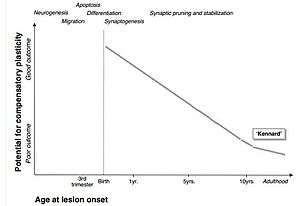Margaret Kennard
Margaret Alice Kennard (September 25, 1899—December 12, 1975)[1] was a neurologist who principally studied the effects of neurological damage on primates. Her work led to the creation of the Kennard Principle, which posits a negative linear relationship between age of a brain lesion and the outcome expectancy: in other words, that the earlier in life a brain lesion occurs, the more likely it is for some compensation mechanism to reverse at least some of the lesion's bad effects.[1]
Margaret A. Kennard | |
|---|---|
| Born | Margaret Alice Kennard September 25, 1899 |
| Died | December 12, 1975 (aged 76) |
| Nationality | American |
| Education | Bryn Mawr, Cornell, Yale |
Biography
She earned a Rockefeller Traveling Fellowship for study in Western Europe from 1934 to 1936.[2] She also studied the effects of stimulants and cortical depressants on monkeys with brain damage.[2]
Kennard Principle

The observation that young brains reorganize more effectively than adult brains was first articulated by Kennard in 1936. Consequently, the notion that how well a brain can reorganize itself after damage as a function of the developmental stage is now known as the "Kennard principle".[3] This research led to one of the earliest experimental evidence for age effects on neuroplasticity.
She worked closely with John Fulton in her famous infant brain studies.
References
- Dennis, Maureen (September 2010). "Margaret Kennard (1899–1975): Not a 'Principle' of brain plasticity but a founding mother of developmental neuropsychology". Cortex. 46 (8): 1043–1059. doi:10.1016/j.cortex.2009.10.008. ISSN 0010-9452. PMC 2907425. PMID 20079891.
- Finger, Stanley. Margaret Kennard on Sparing and Recovery of Function: A Tribute on The 100th anniversary of Her Birth. Journal of the History of the Neurosciences. Vol. 8, Iss. 3, 1999.
- Freberg, L. Discovering biological psychology. 2nd. Wadsworth Pub Co, 2009. 251. Print.